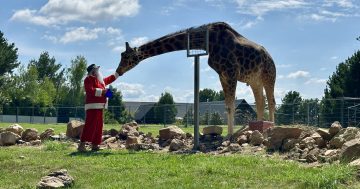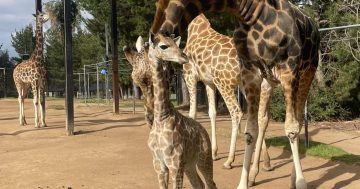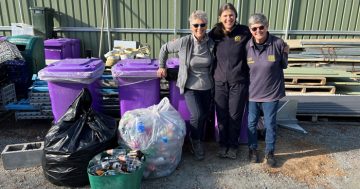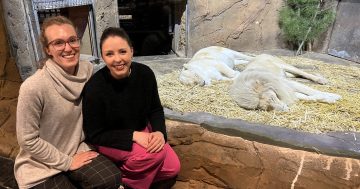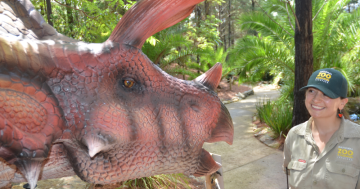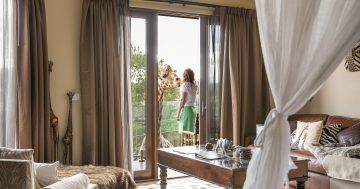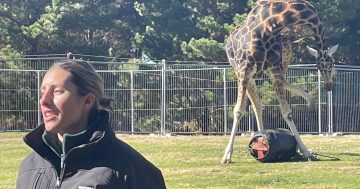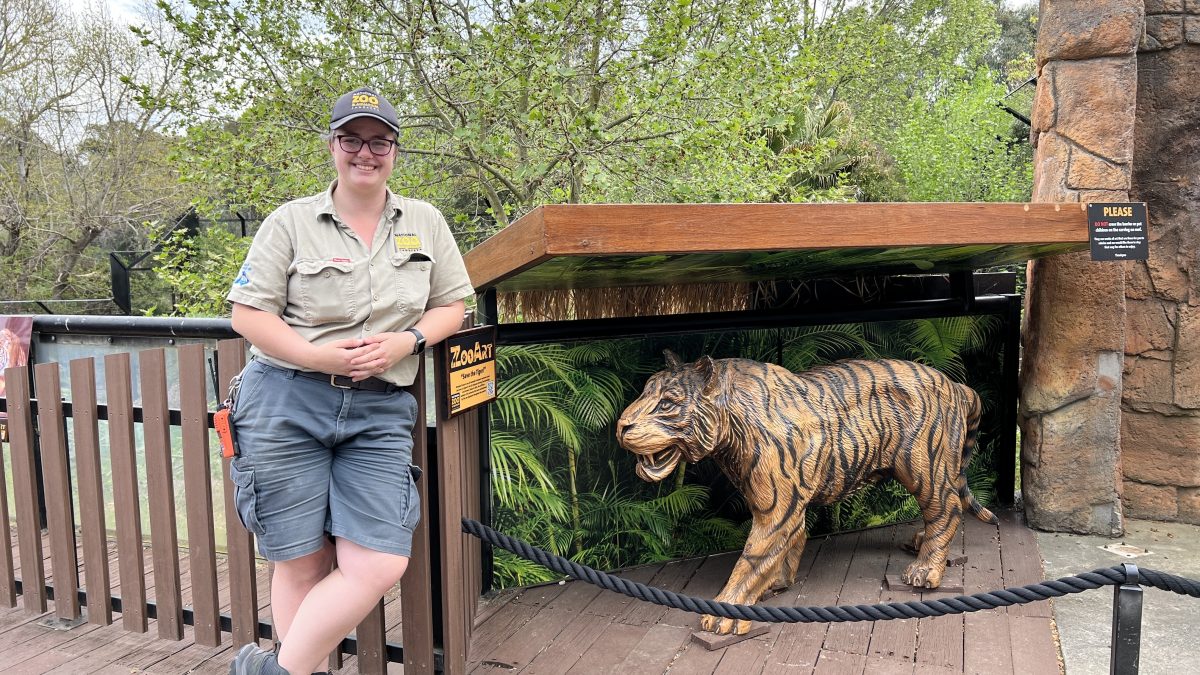
Jessica Cartwright, zookeeper at the National Zoo & Aquarium. Photo: James Coleman.
When Jessica Cartwright was young, the thought of spending her life looking after zoo animals was up there with a career as an astronaut: “One of those mystical kid jobs.”
She continued thinking about that into university when she took up a degree in primary school teaching, but as part of that, she managed to score some practical work experience in the educational program at the National Zoo & Aquarium.
That was in April 2014. Within two years, she was not only a tour guide at the zoo but also one of 80 zookeepers, working alongside volunteers and other employees to make sure the 900-plus animals from all over the world are fed, watered and generally happy.
“I do husbandry, working with the cheetahs and meerkats and a little bit with the small monkeys,” she says.
“It really does take an army to run everything in this place.”
The zookeeper’s average day starts with checking the animals under their care, ensuring nothing untoward has happened overnight. Then comes breakfast.
“You go to food prep, grab all the food, deliver it to all the hungry beasts,” she says.
“Then you’re going to head back and do all the food prep for that afternoon and the next morning. Do your afternoon feeds, do your final checks and go home and collapse in a heap.”
Each animal has their food requirements, dictated by experts in the form of recipes and stuck to rigorously by zoo staff. The result is a building that functions in much the same way as you imagine a hospital kitchen does – a production line of chopping noises.
There are different fruit, vegetable, nut and seed combinations for different birds, live insects and worms for various mammals, and dead rabbits and other meat types for carnivores. For another layer of complexity, animals also have different foods on different days.
“One of the most complex-looking recipes is for our brush-tailed bettongs that shows literally eight, six, and 75-gram measurements, and we have to be quite specific about those,” customer service manager Jemma Walsh says.
“There are days that aren’t their favourite days, too. Banana, sweet potato and peanuts … compared to things like beans or sprouts.”

Zebras are under the care of ‘ungulate’ zookeepers like Elise Maurer. Photo: National Zoo & Aquarium.
It’s not all as simple as dividing between the herbivores and carnivores, either.
Elise Maurer is a senior zookeeper for the ‘ungulate’ animals.
“Anything with hooves, generally,” she explains.
“So we look after some of the lions, tigers, African wild dogs, as well as the giraffes, zebras, deer and alpacas.”
A big part of keeping such animals content in captivity comes down to regular training exercises and “enrichment”. Another staff-only shed at the zoo is stocked with random items from plastic balls to old suitcases, pillows to soft toys – all designed to replicate activities the animals would do in the wild. Even in the case of old perfume bottles, which apparently give the big cats new smells to explore in their enclosures.
Elise has been a zookeeper for 16 years, and despite the fact her daily step count is well into the thousands, she wouldn’t swap it for anything.
“I knew from a very young age that’s what I wanted to do, and I just did everything I could to get there,” she says.
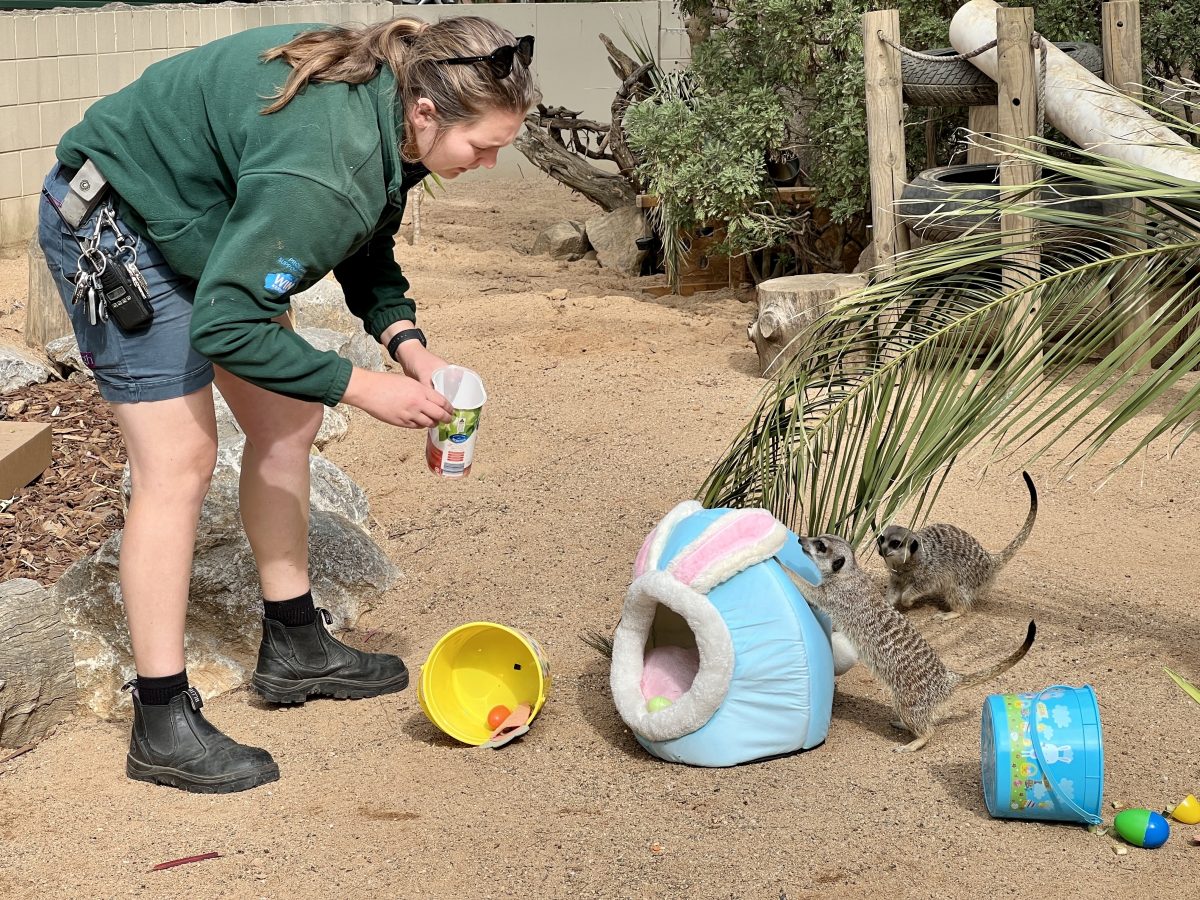
Jemma Walsh treating the meerkats to “enrichment”. Photo: James Coleman.
She studied zoology at university and volunteered her way into a keeping job – one she’s held in various sections at different zoos in Australia. She describes it as “a little bit surreal”.
“Sometimes you get caught up in your day-to-day, but every so often, something happens and you realise how lucky you are,” she says.
One such time was seven years ago when she accompanied patrols into the forests of Sumatra, hunting tiger poachers.
“Didn’t see any tigers, but we did see evidence of tigers and also evidence of potential poachers. And generally, if people are in the forest, they’re not there for a very good reason.”
She says anyone wanting to copy her career path should start volunteering with a local zoo.
“Just to see if it’s what you want to do. A lot of people see all the fun parts but then don’t see all the cutting up of meat, picking up of poo, mowing of lawns and all of that stuff that you have to do as a part of that job.”
The National Zoo & Aquarium is open every day except Christmas Day from 9:30 am until 5 pm.













